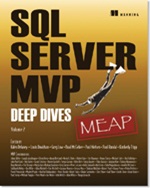Many books through the year are published revolving around SQL Server. Typically they are focused on a features, methodology, design or administrative eccentric. A few years ago, a different type of book was published named SQL Server Deep Dives. This book was essentially all of the others placed into one. This was accomplished by the vast number of authors that were part of the book. Those authors were found completely from one group of well-known experts around the world: SQL Server MVPs.
A SQL Server MVP is an annually awarded title for an individual that has shown a level of community and expert level that far exceeds normal contributions. These authors, as experts in SQL Server, took it upon themselves to write one or more chapters in SQL Server Deep Dives. This made the book as versed and complete of many different angles and looks into SQL Server. Each MVP took a passion, a level of experience or known topic that they, through community involvement, knew would be of value. This was Deep Dives.
This past year SQL Server Deep Dives call for authoring came again in the form of a second volume. SQL Server Deep Dives volume 2 is made up of 63 MVPs. They all took a piece of themselves with SQL Server in the form of one chapter this time. I was fortunate to be an MVP this year and a contributor to Deep Dives, Chapter 50. The chapter revolves around SSIS and how powerful the use of SSIS can be to DBAs and BI Developers.
The best part of all of this is, SQL Server Deep Dives v2 will be at this year's PASS Summit. PASS Summit is in only one more week. At the summit you will be able to purchase Deep Dives v2 as well as a complete book signing from many of the 63. You can find the book on sale at the conference book store and is available to pre-order on Amazon. You can also purchase the book from Manning, the publisher, as an eBook or paperback.
As a reader of SQL Server Deep Dives Volume 1 and an author in SQL Server Deep Dives Volume 2, I highly recommend volume 2 to anyone. Volume 1 was outstanding and this volume will prove to be nothing short of that.
I'd like to give special thanks to the leaders of this book Kalen Delaney, Paul Randal, Kimberly Tripp, Greg Low, Brad McGehee and Paul Nielsen. These key editors and organizers managed the books many authors, reviewing and editing. Without them, this book would not be available for PASS.







